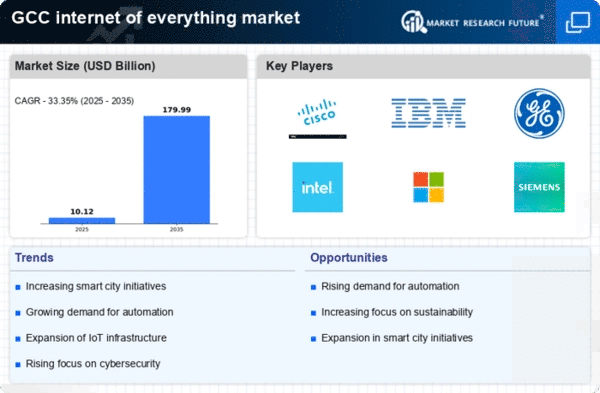Rising Demand for Connectivity
The increasing demand for connectivity in the GCC region is a primary driver of the internet of everything market. As urbanization accelerates, the need for seamless communication between devices and systems becomes paramount. The GCC countries are investing heavily in infrastructure to support this connectivity, with initiatives aimed at enhancing broadband access and mobile network capabilities. For instance, the region has witnessed a surge in 5G deployment, which is expected to cover over 90% of the population by 2025. This enhanced connectivity facilitates the integration of various devices, thereby driving the growth of the internet of-everything market. Furthermore, the proliferation of smart devices and applications is likely to contribute to a projected market growth rate of approximately 25% annually in the coming years.
Government Support and Regulation
Government support and regulatory frameworks play a crucial role in shaping the internet of everything market in the GCC. National strategies, such as Saudi Arabia's Vision 2030 and the UAE's Smart City initiatives, emphasize the importance of digital transformation and innovation. These strategies encourage investments in IoT technologies and create a conducive environment for startups and established companies alike. Additionally, regulatory bodies are working to establish standards that ensure interoperability and security within the internet of-everything market. This regulatory clarity is expected to attract foreign investments, further stimulating market growth. As a result, the internet of-everything market in the GCC is projected to reach a valuation of $20 billion by 2026, reflecting the positive impact of government initiatives.
Increased Focus on Sustainability
The growing emphasis on sustainability in the GCC region is driving the internet of everything market. Governments and businesses are increasingly recognizing the need to adopt eco-friendly practices and reduce carbon footprints. IoT technologies enable efficient resource management, such as smart grids and intelligent waste management systems, which contribute to sustainability goals. For example, smart irrigation systems powered by IoT can optimize water usage in agriculture, a critical concern in arid regions. The internet of-everything market is likely to benefit from this trend, as companies seek solutions that align with sustainability objectives. It is estimated that the adoption of IoT solutions could lead to a reduction in energy consumption by up to 30%, further enhancing the market's appeal.
Advancements in Artificial Intelligence
Advancements in artificial intelligence (AI) are significantly influencing the internet of everything market in the GCC. AI technologies enhance the capabilities of IoT devices, enabling them to analyze data in real-time and make autonomous decisions. This integration is particularly relevant in sectors such as manufacturing, logistics, and healthcare, where efficiency and accuracy are paramount. The GCC region is witnessing a surge in AI investments, with the market expected to reach $15 billion by 2027. This growth is likely to drive the adoption of AI-powered IoT solutions, thereby expanding the internet of-everything market. Companies are increasingly leveraging AI to improve operational efficiency and customer experiences, indicating a strong correlation between AI advancements and market growth.
Growing Consumer Awareness and Adoption
Consumer awareness and adoption of smart technologies are pivotal drivers of the internet of everything market in the GCC. As individuals become more informed about the benefits of connected devices, the demand for smart home solutions, wearables, and other IoT applications is rising. The proliferation of smartphones and internet access has facilitated this trend, allowing consumers to engage with IoT technologies more readily. Market Research Future indicates that the smart home segment alone is projected to grow at a CAGR of 30% over the next five years. This increasing consumer interest is likely to propel the internet of-everything market forward, as companies strive to meet the evolving needs of tech-savvy consumers.
















